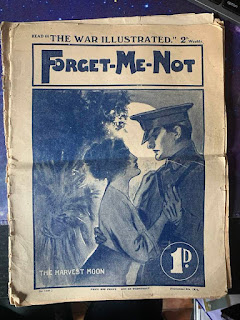With thanks to Debbie Cameron and Michael Day for their research into Ella D. Farrar
WW1 poem found by Debbie and Biographical details found by Michael Day @bindonlane@mastodon.world@bindonlane
On the 1881 Census, we find Ella boarding - presumably at school – in Reweley House, 7, Welington Square, Oxford St Giles, Headington, Oxfordshire, UK. It seems Ella may have been a teacher before becoming a journalist and writer.
On the 1911 Census, Ella is described at a writer and sub-editor for the Amalgamated Press. By 1921, Ella and her sister were living in Hemel Hempstead, Great Gaddesden, Hertfordshire, UK, where Ella died in 1929.
The poem was found by Debbie Cameron and posted on her Facebook Group https://www.facebook.com/groups/1468972083412699
“Forget-me-Not – A Pictorial Journal for the Home’ ,which began publication in 1891, was one of the many periodicals founded by Alfred Harmsworth. Along with “Answers” (1888) and “Comic Cuts” (1890), “Forget-Me-Not”(1891) was the backbone of what was on its way to becoming the largest publishing empire in the world, the Amalgamated Press. Alfred Charles William Harmsworth, 1st Viscount Northcliffe (1865 – 14 August 1922), was a British newspaper and publishing magnate. As owner of the Daily Mail and the Daily Mirror, he was an early developer of popular journalism, and he exercised vast influence over British popular opinion during the Edwardian era. Lord Beaverbrook said he was "the greatest figure who ever strode down Fleet Street."
“Forget-Me-Not” was based in London’s Tudor Street, which runs south to the Thames from Fleet Street, with the advertising sold by Greenberg & Co. just up the road at 80 Chancery Lane. The imprint reveals a third address, for “Forget-Me-Not” was printed by The Geraldine Press at 21 Whitefriars St, which runs parallel to Fleet St but nearer the Thames.
Like all the penny magazines, it was a cheap affair though, on newsprint with a greenish cover not unlike “Tit-Bits”, the model for “Answers”, for which Alfred had worked. The masthead page inside described “Forget-Me-Not” as ‘the most useful home paper’ and it carried fashion hints and articles on fancy work and households management, as well as fiction. The best illustrations were saved for the paper patterns that readers had to send for at a shilling or two each. None of the articles or illustrations carried a byline.
Most of the pages carried marketing messages printed at the bottom such as: 'Forget-Me-Not is a great help to young couples in all household matters’; ‘Home, Sweet Home [another Amalgamated title] is published on Fridays – 1d’; ‘Answers is the paper for a railway journey’; and ‘This paper is published every Thursday’.
Amalgamated Press aimed to have a magazine for all types of readers with three women’s weeklies, the smaller format “Home Chat” making up the trio.
One of the editors of Forget-Me-Not, a Hungarian called Arkas Sapt, has been credited with developing a new way of publishing several pictures on a spread, a technique that was to be vital in reinvigorating the Daily Mirror as an illustrated paper after its flagging launch.
Sources: Find my Past, Free BMD
https://magforum.wordpress.com/tag/forget-me-not/


